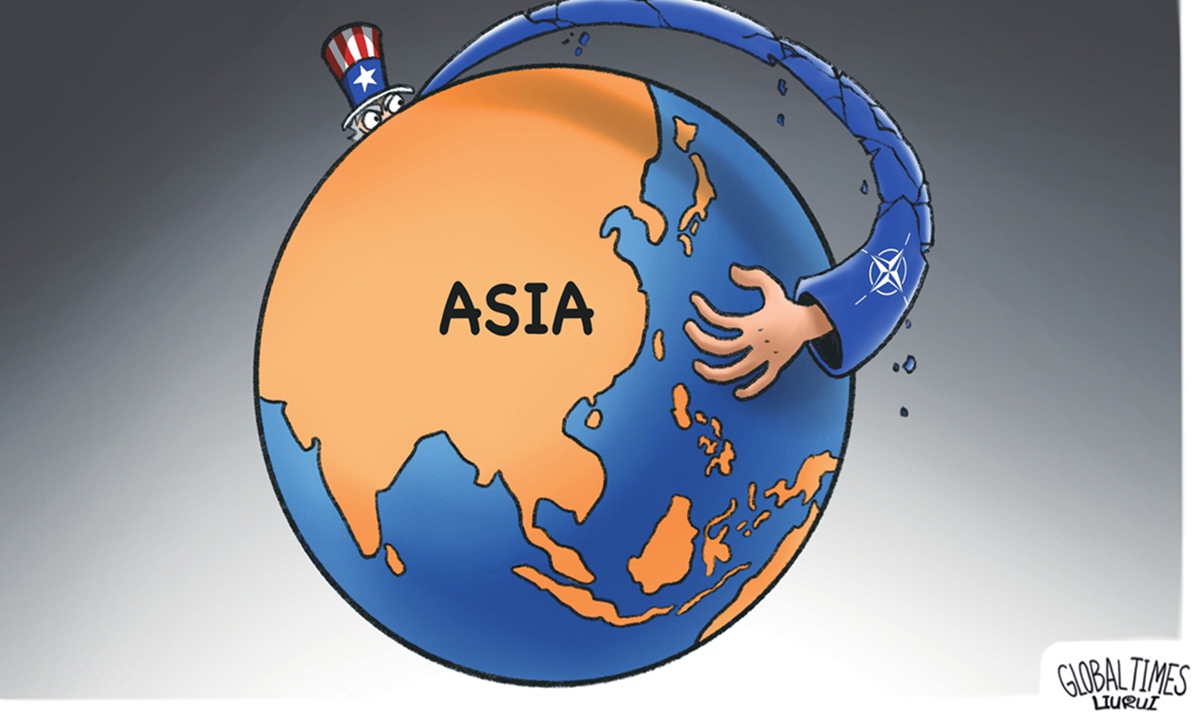
Illustration: Liu Rui/Global Times
NATO will deepen its cooperation with the four major partners in the Indo-Pacific region, namely Australia, Japan, New Zealand and South Korea, and develop an Individually Tailored Partnership Program (ITPP), a higher form of partnership, Japan's Nikkei Asia reported on Tuesday. Experts warned this is a crucial first step in the alliance strategy, and by bringing these countries into the alliance, NATO will expand its influence in the process of eastward expansion while also playing a strategic role in containing China.
Cui Hongjian, director of the Department of European Studies at the China Institute of International Studies, told the Global Times that these four countries, referred to NATO's "partners across the globe," have had some basis for cooperation before, albeit in a semi-transparent state. This time, the cooperation is being made public and institutionalized, which is an obvious trend for the foreseeable future.
NATO needs to provide a more explicit statement on how it plans to enhance relations with these countries and what role it wants to play in Asia-Pacific security. The extent to which NATO and these countries develop cooperation will affect the latter's judgment of the regional security situation and even their security policies, which is the most important aspect worthy of attention, Cui emphasized.
The opening of a NATO liaison office in Japan has faced opposition from French President Emmanuel Macron. According to Nikkei Asia, an idea floated among NATO members is to characterize the Tokyo office as a facility for smoothly implementing the four ITPPs, with the hope of gaining support from France.
Clearly, there is currently no consensus within NATO on how to develop relations with Asian countries, and at least France has shown reluctance for NATO to become more involved in security affairs in the Asia-Pacific region. Therefore, NATO is now seeking to develop relationships with these four countries under a different pretext, primarily to balance the internal differences of opinion.
It doesn't matter what pretext is used, what matters is paying attention to the substantial actions that NATO will take and understanding the purpose of developing relations with these countries. In other words, NATO wants to find an alternative way to achieve strategic alignment by maintaining its perceived survival and development through external expansion. This is an established direction and objective, Cui noted.
Zhao Junjie, a research fellow at the Chinese Academy of Social Sciences' Institute of European Studies, said it is crucial to understand that the strategic motivation behind NATO's expansion to the East is not simply about bringing a few countries together. In this process, NATO needs to allow these countries to express their own interests and demands. For example, Japan naturally hopes to set the liaison office, and in the next step, even branch offices could be established in Japan.
Nikkei Asia quoted a European ambassador in Tokyo who stated that once the ITPPs are finalized, "the next logical step will be to have a liaison office in Japan." This clearly aligns with the desired outcome of Japan and the US. However, NATO's action does not necessarily mean that they will truly win Paris' support.
"France has good reasons to oppose the establishment of a liaison office in Japan. NATO's defense scope is limited to the transatlantic region, and its eastward expansion goes beyond its traditional geopolitical concept. This overlooks the security of Europe, which NATO protects, and undermines the foundation of the traditional Western alliance. Additionally this move will continue to provoke China," Zhao said.
He noted that NATO claims its eastward expansion aims to maintain stability and peace in the Asia-Pacific region. However, in reality, NATO, driven by US interests, is continuously stirring up trouble in the Asia-Pacific. In order to provoke and contain China, Washington will continue to create incidents and tensions over issues such as the Taiwan question and the South China Sea. There is even the possibility of accidental military clashes with China.
During the process of eastward expansion, NATO aims to adopt an alliance strategy by continuously forming anti-China alliances, thereby achieving its strategic objectives of expansion. NATO wants to create different grips and pull in different coalition partners. This process is akin to weaving a large net to contain China, with the scope of the net expanding and the intensity increasing. In such a situation, we cannot simply sit back and do nothing, Zhao warned.




